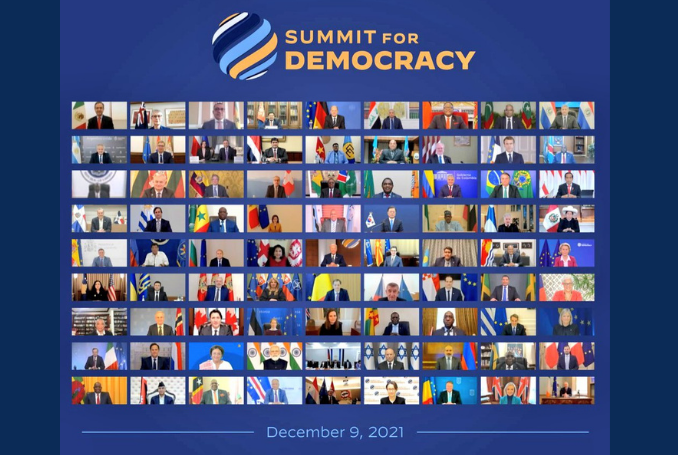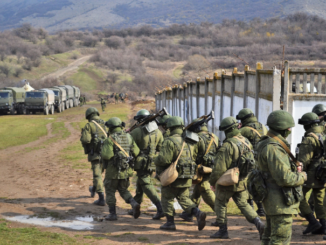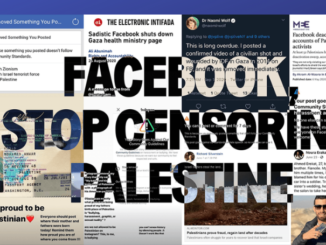
By Jim Miles
The US Summit for Democracy has come and gone without too much fuss. It was a strange little show with the leader of the so called ‘free world’ – being those “democratic” countries that for whatever reason support US dictates – attempting through rhetoric and probably a few winks and nods to maintain its establishment as the group’s leader. From what I saw in the MSM it really amounted to little and may well have shown how weak the supposed leadership is.
It did however raise the very good question of what democracy is. From its etymological roots, it simply means essentially “power by the people” although even that has various interpretations, none straying far from that simplicity. As for practical applications, there are many different routes that can be taken, different levels of democracy depending on initial premises. For example, the idea that capitalism is the main pillar of democracy is a premise that allows all kinds of actions that are decidedly non-democratic. To present arguments as to what democracy leads into a mess of philosophical arguments leaving no verbiage unturned in pursuit of its definition to support politicians’ practical applications.
It is therefore not a good argument to get into. Instead what makes more sense is to look at how societies apply their laws domestically in practical situations towards their citizens and with foreign affairs against others. In other words, the following is more a look at actions taken that are definitely non-democratic, a view that seriously limits the understanding of democracy as “power by the people.”
Freedom and Democracy
There needs to be a differentiation between freedom and democracy. While the two go together well, freedom can be had without democratic control, according to the whims of the government, and according to the perhaps unseen aspects of domestic control (laws and belief systems) that are disguised as freedom. An example of the latter would be the theorized “rugged individualism” as propounded by many US authorities which really indicates that, if one cannot make it in society it is all your own fault and not society’s.
Domestic
There are some big obvious practical issues that deny democracy. Probably the biggest is racism in its many forms. Different laws for different sections of the population based on race or ethnic background are decidedly non-democratic. This includes various “reservation” systems as applied to all the British colonial heritage countries, mainly the “Five Eyes”, the imperial system as exercised in Canada, the US New Zealand, and Australia. It includes apartheid states like Israel, and formerly South Africa.
Domestic spying is another form of non-democratic action. Still, with the Five Eyes, their nominal designation is based on their actions of spying on foreign countries, including those within the group – one of their main purposes is to avoid the legal entanglement of a government spying on its own people. Other countries are not so constrained and any government that has a security system for internal security certainly spies on its citizens. Canada’s government has its Communications Security Establishment (1946) and its better-known component, CSIS. The USas various spy and policing agencies, the FBI being the best known, keeping records on many of its citizens mainly for political reasons. Israel’s Shin Bet works hand in hand with the military to control the indigenous Palestinian population.
Along with those spy organizations goes a highly militarized police force. These forces are used to control opposition street-level (democratic) protests against mostly corporate actions supported by governments. This comes back to reservations and apartheid as much of the use of militarized police is to control domestic protests originating from land and resource arguments from indigenous populations. Accompanying this on various levels are outright murder, torture, inhumane treatment, and outright deniers of humanitarian law. Examined in this light, the Five Eyes and Israel are decidedly non-democratic.
Election laws and rules have a large impact on the application of democracy. For all its self-vaunted mastery of democracy, the whole US system is clearly non-democratic. They put on a great show with constant year-round electioneering and much less governing for the people. The current system of the Electoral College was mainly established to keep the rabble, the “factions” from having any say in governance. The gerrymandered districts effectively assure certain areas of remaining with a particular party and are usually based on race or ethnic background although in Ireland it contains the religious component as well (although that is mostly ethnic-immigrant Scots versus indigenous Irish). Many other smaller seemingly innocuous laws limit democracy, some being simply outright petty and stupid, such as Georgia’s law against giving water to voters.
One of the larger factors in the US is the huge amount of money corporations are allowed to spend on elections as determined by “Citizens United” in which donations of money are considered free speech and corporations are “people”. Supposedly intelligent people believe this stupidity – mainly as it serves their own power and finances. There is no people’s power when corporations are usually able to buy their favored candidate. The combination of predatory financialization (meaning most of us to live in debt servitude of some kind) to some bank or other) and corporate militarism (spending huge amounts of money ’liberally’ distributed throughout the country for political gains) certainly do not give power to the people.
Corporations
The corporate world straddles the domestic and foreign affairs realm. Basically, corporations are non-democratic by nature. Their purpose is to make profits and protect owners against financial losses as well as externalized costs such as environmental damage which includes the poisons of resource extraction, the removal of land from public or indigenous jurisdiction, and the creation of an impoverished workforce.
Much of that profit recently has come from the huge amounts of Quantitative Easing supplied by the US Government in liaison with the Federal Reserve (a series of private banks supposedly directing the economy). The stock markets and commodities markets are all manipulated and serve mostly the wealthy who benefit most from the tax cuts, low-interest rates, and government subsidies.
Corporations can be simply about business, but as seen above, corporations are also well tied into the security apparatus of the country, from the militarized police forces to laws that generally protect the rights of corporations over the rights of citizens, in particular indigenous citizens. Further, many that appear to be superficially benign are highly involved in the production of equipment and materials for various spy agencies and military agencies. Boeing, Kodak, Intel, General Electric, Amazon, Facebook are all well known domestic names with strong ties to the military and security apparatus of the US Israeli corporations are highly militarized – as is the state – and its “field-tested” security and military equipment is sold around the world to various other governments acting in a non-democratic manner.
Canada’s corporations act decidedly in a non-democratic manner in certain situations apart from the externalized costs. Mining, forestry, and energy companies frequently intrude on indigenous land and retain special rights also to public lands. With the ultimate control of all land-based on the “sovereign” as per millennia-old racist laws, governments and corporations operate together against the will of the people.
Foreign Affairs- Economic
Apart from domestic non-democratic actions, actions taken within or against other countries are frequently non-democratic. It is a combination of military and economic actions that are used to deny the sovereignty of other nations even if many are nominally democratic.
“Free trade” is one of the more obvious non-democratic sets of rules globally. Designed in secret without public input, seldom if ever voted on either by referendum or representatives[1], these agreements are designed to give freedom only to the movement of money and profits. Any impedance to that movement is generally fought not in the courts but in private arbitration structures that abide by the decisions of the theoretical “experts” chosen by the aggrieved complainant, usually a large international corporation.
The agreements have nothing “free” for the workers and end up weakening workers’ rights. There is nothing “free” for the environment and quite the opposite – pretend losses due to environmental laws are liable to lawsuit compensation against governments. Which adds to the point that people are not able to sue governments, in some cases governments cannot sue corporations, yet corporations are “free” to sue governments.
The global financial institutions are not democratic by any definition. Mostly controlled by the US – the US or EU based international corporations (banksters et al) – democracy is not available to those coming under the dictates of the IMF and World Bank [2], nor the larger constraints of the SWIFT settlement system or the rulings of the global oversight Bank of International Settlements (BIS).
Beyond the manipulations of financial institutions is the use of sanctions. Sanctions can be applied in a positive manner as exemplified by the BDS sanctions that worked to eliminate apartheid in South Africa [3] and are currently being used to support Palestinian rights in occupied Palestine (being all of Israel). Both of these uses developed from grassroots initiatives, truly democratic actions against oppressive non-democratic regimes.
Using sanctions as an economic/military weapon has become the main method of international relations with the US. Arguably better than outright war, they cause enormous suffering mostly to the citizens of the countries they are applied to. What is currently working against them is the indigenous resistance against ceding to the demands of the sanctions. Venezuela, Cuba, Iran, Syria are all surviving the sanctions imposed by the US and its allies of the ‘west’, establishing a resistance to empire supported by other countries with more resources.
Russia to a degree has actually benefited from sanctions as it, fortunately, has a large resource base and has become a strong agricultural center. It has also divested itself of ties to US debt obligations and on a debt to GDP ratio is probably one of the strongest economic countries in the world. Counter to desires, sanctions have also pushed Russia and China much closer geopolitically creating a new multipolar world – that does not necessarily make it all democratic, but it puts a preventative in place against US military and economic aggression.
Foreign Affairs – Military
There is not much really needed to say about how military interventions and occupations are anti-democratic. Having one’s country destroyed by someone else’s military on any pretense simply denies democracy. The supposed “right to protect” mantra used by the US and NATO on several occasions has proven to be a total disaster – which arguably is one of the hoped-for outcomes as these “disasters” are profitable for the corporate militarized world and ideal to shape a “failed” country that needs submit to imperial desires.
The US/NATO are the primary guilty party for all kinds of military interventions used to serve the purpose of the empire. Yugoslavia/Serbia, Iraq, Libya, Syria, Yemen, Ethiopia are all current examples of either direct western military interference or subsidized military manipulation. There are many other smaller events occurring globally, directed and supported by the US and allied (MI6, Mossad, CSIS) covert services. It is tiring to repeat it, but it is significant – with over 800 military bases around the world in over 125 countries, U.S./NATO/EU foreign policy is mainly determined by illegal military interventions.
Democracy Now?
Contemporary geopolitical currents make global democracy a highly contentious issue. The US empire is continually looking for a bad guy as required by the military-industrial-financial community in order to maintain their power over the people of the world. They are currently acting aggressively against both China and Russia with two areas – Ukraine and Taiwan – being possible flashpoints for some kind of war, while continuing their smaller aggressive actions in areas of geopolitical interest – Ethiopia and Yemen being two of many current hotspots.
Beyond wars, the current world of financial manipulations has led to huge inequalities within countries and between countries. Structured mostly on debt manipulations of one kind or another, the US economic system is slowly having its impact reduced, but its overall enormity – mostly due to the global reserve nature of its currency – keeps it powerful. But power built on debt and large manipulations of economic factors could also lead to an equally enormous collapse.
Finally, one of the more discussed but practically ignored situations is climate change. Lots of greenwashing occur but until the grassroots of society change and demand change to the overall debt-burdened consumer society powered by economic structures and military structures, climate impacts will simply be absorbed and placed under the rubric of “disaster capitalism,” and the corporate interests will harvest their profits until flooded or burned out.
In sum, democracy is a wonderful ideal, superficially widespread, but with major aspects of society that truly deny it. Many places have personal freedom, but limited also for many by economic, social, educational, and other civic structures, many racist, many class-oriented. Until the non-democratic aspects of the financial world, the military world, and global climate change are dealt with, democracy will be a commodity in name only.

– Jim Miles is a Canadian educator and a regular contributor/columnist of opinion pieces and book reviews to Palestine Chronicles. His interest in this topic stems originally from an environmental perspective, which encompasses the militarization and economic subjugation of the global community and its commodification by corporate governance and by the American government.







